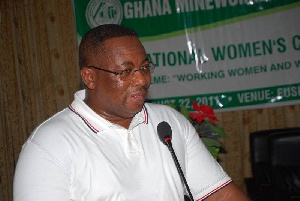Mr Prince William Ankrah, the General Secretary of the Ghana Mine Workers Union (GMWU), has called for a local content law specific to the mining sector in order to reverse the decreasing Ghanaian participation.
Speaking at the just ended National Executive Council Meeting of the Union in Accra, Mr Ankrah said over the last 100 years Ghanaian involvement in the mining economy had been abysmally low.
According to him, the proposed Local Content Law, akin to that currently operating in the oil and gas sector, would help to reverse the dwindling Ghanaian situation when introduced.
“Indeed, the only State pride left in the industry; Prestea Sankofa Gold, that we always cherish and support to see grow and flourish, is almost at the verge of collapse,” he said.
Mr Ankrah said although there were some emerging Ghanaian-owned mining businesses such as Rocksure International and Engineers and Planners, and also some small scale mining business, they needed to be motivated and supported to change the gloomy picture.
Unfortunately, Mr Ankrah said, those local businesses were not competitive with their foreign counterparts for several reasons, especially with respect to the high cost of borrowing.
“Apart from the challenges associated with access to capital, cost of borrowing is also extremely expensive. Indeed while their foreign counterparts are borrowing between 0% and 5% to do the same businesses, Ghanaian businesses are borrowing over 30% and that certainly is a very challenging pedestal to begin with, to say the least,” he said.
Government, Mr Ankrah said, must institute clear-cut growth pipelines for Ghanaian-owned mining businesses to enable them to perform and transition into large scale mining conglomerates in the long run.
On the Obuasi Mine, he expressed disappointment with government’s slow response towards its revamping.
He said although the Union advised government to take keen interest in the company because of its resource potential, it (government) did not listen.
He said government’s swift decision to prioritize the revamping of the Obuasi Mine would help “save lives, save families and marriages, shore up the country's foreign exchange, grow the economy, and above all restore the glory of the Obuasi Mine back to its rightful and well-deserved place in the league of gold producing mines in Ghana.”
Mr Ankrah, however, commended the Government and the other stakeholders for the successful passage of the Mineral Development Fund Bill into law and called for concrete steps to be taken for its operationalisation.
Mr Kwarko Mensah Gyakari, the National Chairman of the Union, said another major concern confronting the mining sector was the uneven remuneration landscape to the detriment of Ghanaian employees.
He said the situation, if not addressed, could challenge the peace the industry had enjoyed for the past years.
“The way forward is to adopt global compensation which seeks to maximise welfare and minimise recurrent cost to the industry.”
“We cannot continue to depend on our traditional Collective Agreement for our survival. Instead we must align our thinking to Union’s renewal strategies,” Mr Gyakari said.
On the upcoming presidential and parliamentary
Business News of Monday, 5 December 2016
Source: GNA













